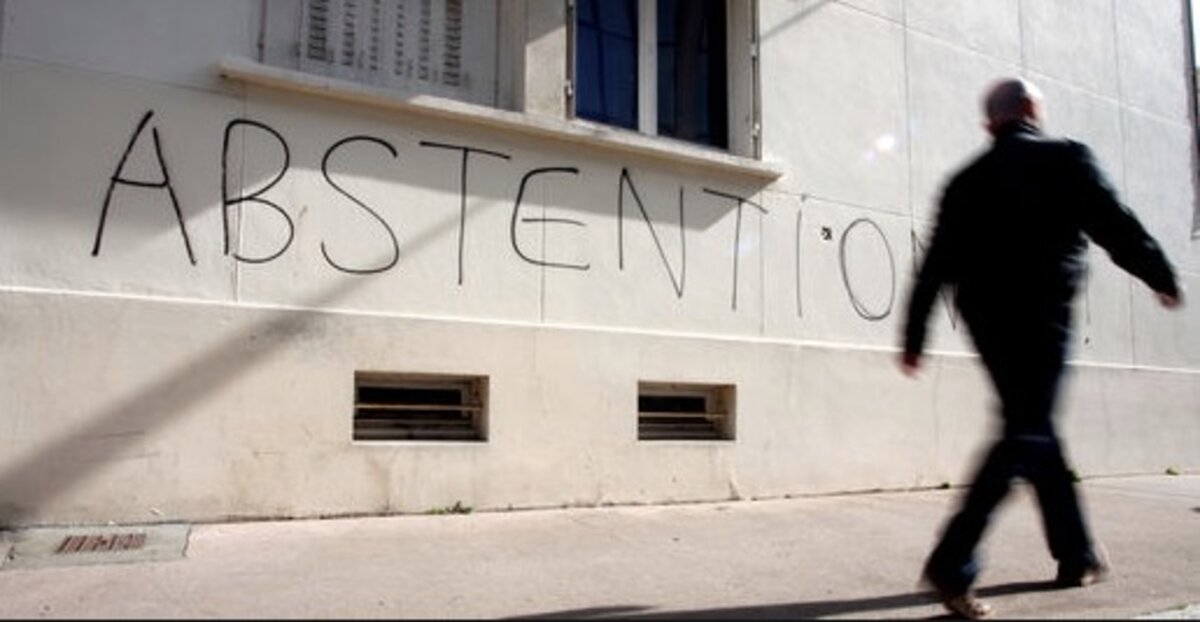It is as regular as clockwork; when the results of the day’s voting become clear on election nights in France, the abstention rate is swiftly forgotten by those who won, while it is loudly underlined by those who lost. The euphoric victors announce that “the people” have decided, while the sorry defeated maintain that the result is an optical illusion, that they didn’t really lose because their rivals didn’t really win.
As of midday this Sunday, the reporting scenario will be the same as in all general elections. The first estimated figures on turnout will be published and political commentators will, in endless detail, compare it with previous elections. At 5pm a second figure will arrive, this time from the interior ministry, and at about 6pm polling organizations will provide what will be a pretty much definitive indication of turnout.

Then, for about two hours, the turnout percentages will be studied in minute detail, as if essential information, while TV images of the party headquarters will show, variously, atmospheres of disappointment and joy. But then, at 8pm, the drum roll begins, the warm-up act of the turnout slips backsatge and the first results appear. The winners will politely comment on the turnout, but just for good measure, preferring to underline the number of votes cast and which have given them the lead, no matter that an election victory is not the same when it is won from four votes out of five, or one vote in two.
It has been widely forecast that this Sunday turnout will be down to the point of representing between 55% and 60% of the electorate. If that proves true, the number of abstentions should be of concern, and a cause for modesty, to the future parliamentary majority. Just as was the case for its predecessors, the new ruling party will have a significant institutional problem on its hands.
Abstention is caused by a complex set of reasons, but if the polling booths of legislative elections witness significant desertion it is quite simply that they have lost their meaning. They are regarded as the trail behind the comet of the presidential ballot. Every time when legislative elections have been held within six weeks of the presidential elections – in 1981, 1988, 2002, 2007, 2012 – they have been marked by a spectacular and increasing fall in turnout. The National Assembly, the lower house, is regarded as an annex of the Elysée Palace; an appendage, an excrescence.
That said, the election winners are not the only ones who should be concerned about the abstention rate. The losing parties use those absent from the urns to reaffirm their own presence, transforming those who abstain into a subliminal electorate, as if they somehow had voted for them by not voting. But the idea that this immobilised electorate represents a pool of support for trailing political parties is an illusion.
Those who abstain are potential voters like any others, and far from being separate to the broad electoral trend they actually reinforce it. In 1981, the wave of the Left swept across France, and those who abstained from the elections were made up largely of a rightwing electorate who, by not voting, reinforced the political majority behind the newly-elected socialist president François Mitterrand. The same was true in 1988. But in 1993, the Right won a landslide victory in parliamentary elections (at that time, presidential elections were every seven years as opposed to the current five) when most of those who abstained were the leftwing electorate. In the 1997 parliamentary elections – snap elections called by then conservative president Jacques Chirac – it was the Left which won and the Right which made up most of the abstentions. In 2002 and 2007 it was the Right which won and the Left which abstained, while in 2012 it was the reverse.
Far from being a base of support for those parties who were beaten, the abstention rate confirms the underlying trends, and those who lose cannot lay claim to those who didn’t vote as being a force with which to challenge their rivals and salvage their score. If the far-right Front National party has a poor result this Sunday, it cannot use the abstention rate as a cushion for its fall. If the Socialist Party does as badly as predicted, namely garner less than 10% of votes cast, its collapse won’t be any the less real because of what may be a record low turnout.
And if the radical-left France Insoumise (France Unbowed) movement fails to equal the score of its leader Jean-Luc Mélenchon in last month’s presidential elections (when he garnered just less than 20% of votes cast), it only has itself to blame, not those who stayed at home.
Abstention sounds the alarm for democracy in general, and in no way represents a spare wheel for any political current. It is neither invalidating for those who win the election, nor a subterranean army for the defeated.
It would be quite singular that opinion polls can punctuate political life with their surveys of voting intentions among a sample of 1,500 people, while the choices of France’s 23 million-strong electorate are relativised. It would be strange that the exit poll surveys of 1,000 people could provide the final result to a half decimal figure, while the actual votes cast by 60% of the electorate are painted with interpretations.
But, you will see, that is what will happen on Sunday, when the ritual will begin again, when the winners will swiftly forget the message of those who abstain, and the losers will speak of them as a reason why they didn't really lose.
-------------------------
- The French version of this article can be found here.
English version by Graham Tearse


